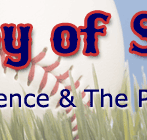Summing it up (written 11/4/07)
So the Sox are champions again, and Boston has had its dowtown victory parade (five days ago), but the fans of New England have already moved on. For today our undefeated football Patriots are in a must-win game against the undefeated Colts, and so now we fans are supposed to be gearing up for yet another “game of the century”. Different team, different sport, but the same fan passion is supposed to be on tap. But I for one don’t feel it. I plan to watch the game (after all, it will feature two of football’s all-time great quarterbacks) but although this sounds like heresy, it’ll be enough for me to see a well-played game, regardless of who wins. I’d certainly prefer the Patriots to win, of course, but my happiness doesn’t depend on it.
What does this all mean? Can I still be considered a real fan (short for “fanatic”, remember)? Have I lost my blood lust, have my competitive (ie, masculine) juices dried up, did I finally emerge from an extended adolescence, or have I actually reached the enlightened state of transcendence? These aren’t trivial questions, and here are some thoughts about the nature of sports fanaticism.
Many factors contribute to sports fanaticism. Here are a few that I’ve experienced personally, and they may help explain the phenomenon (assuming that I’m a somewhat typical fan):
1. Sub-personalities: We all play different roles in life, acting out different personas in different situations, and probably coming closer than we’d like to admit to having multiple personality disorder. So in the spirit of connecting with my Inner Child, I offer this analysis. My adolescent sub-personality - the late-developing middle school geek who didn’t like getting pushed around by brawny jocks – enjoyed 2004 immensely. And coupled with all those recent NE Patriot football Superbowl championships, I/he has finally had my/his fill of winning out over all others, I/he am/is now able to look at both sides now – winning and losing – with a certain amount of equanimity. I/He no longer requires a win in order to maintain my/his sense of self-esteem. But the chance for vicarious life victories by identifying with the aggressor still has its appeal. For the many who can’t “get a life”, team sports is the next best thing to being a champion in one’s own life.
2. Tribalism: I was exaggerating a bit in #1, since I’m not quite the stereotyped sports junkie who lives his life vicariously (I think). But I do have enough of the addict in me to recognize its power, and that’s surely part of sports’ allure – the chance to collectively feel connected to a person or group who’s powerful and effective, to feel a part of a tribe that survives and conquers successfully. I’ll leave it to the cultural anthropologists to flesh out this tribal element, but it’s a key component of the sense of connection that I, and others, feel so strongly though sports in our post-industrail, post-tribal era.
3. Testosterone: I’m middle-aged, and my testosterone levels might have fallen so low that I can no longer muster the same old energy for other competitive encounters, life-or-death or not. I’ll let my wife be the final judge about testosterone-related matters, and just say that there surely is a biological/hormonal component to the urge to win. With Boston being the temporary home for hundreds of thousands of hormonal college kids, maybe we do have a higher than normal citywide quota of competitive juices. The average age of the fans at the Sox parade was barely 20, and a rowdy crowd they were. Maybe this demographic is the real source of the energetic juice that fuels RSN’s hidden power.
4. Rooting for Excellence: The whole idea of enjoying a sporting contest without favoring one side or the other seems grand-parental like hoping that all the kids at the Little League game or dance recital or skating contest do well. But it’s a big point, and it harkens back to what Prof. William Tiller of Stanford said in our interview last year. He said there’s a different kind of energy involved when you root for the beauty of the game and the excellence of the performances, rather than for one particular winner or loser. He felt that this sort of unpolarized energy was quieter and subtler, but ultimately more powerful, than the winner’s pride/Us vs. Them energy that’s so common at sporting events (and in modern American life in general).
That subtler energy is more compassionate and heart-centered, and if Professor Tiller is to be believed, it builds a standing wave of resonant energy between crowd and players that’s more stable than whatever the rah-rah-rah energy generates. Does it help players more than the adrenaline rah-rah-rah energy? That’s hard to know, and maybe impossible to tease out. Some of the research on distant prayer shows that non-directive prayer (“for your greatest good”) has more of an impact than directive prayer (“beat your cancer”). The analogy seems to fit, so why shouldn’t it be the same with fan energy.
Well, this was obviously not a definitive list of contributing factors, but at least it explains a lot about the fan I know best – me. What are the key ingredients are on your list? Post a comment, and let me know.
What does this all mean? Can I still be considered a real fan (short for “fanatic”, remember)? Have I lost my blood lust, have my competitive (ie, masculine) juices dried up, did I finally emerge from an extended adolescence, or have I actually reached the enlightened state of transcendence? These aren’t trivial questions, and here are some thoughts about the nature of sports fanaticism.
Many factors contribute to sports fanaticism. Here are a few that I’ve experienced personally, and they may help explain the phenomenon (assuming that I’m a somewhat typical fan):
1. Sub-personalities: We all play different roles in life, acting out different personas in different situations, and probably coming closer than we’d like to admit to having multiple personality disorder. So in the spirit of connecting with my Inner Child, I offer this analysis. My adolescent sub-personality - the late-developing middle school geek who didn’t like getting pushed around by brawny jocks – enjoyed 2004 immensely. And coupled with all those recent NE Patriot football Superbowl championships, I/he has finally had my/his fill of winning out over all others, I/he am/is now able to look at both sides now – winning and losing – with a certain amount of equanimity. I/He no longer requires a win in order to maintain my/his sense of self-esteem. But the chance for vicarious life victories by identifying with the aggressor still has its appeal. For the many who can’t “get a life”, team sports is the next best thing to being a champion in one’s own life.
2. Tribalism: I was exaggerating a bit in #1, since I’m not quite the stereotyped sports junkie who lives his life vicariously (I think). But I do have enough of the addict in me to recognize its power, and that’s surely part of sports’ allure – the chance to collectively feel connected to a person or group who’s powerful and effective, to feel a part of a tribe that survives and conquers successfully. I’ll leave it to the cultural anthropologists to flesh out this tribal element, but it’s a key component of the sense of connection that I, and others, feel so strongly though sports in our post-industrail, post-tribal era.
3. Testosterone: I’m middle-aged, and my testosterone levels might have fallen so low that I can no longer muster the same old energy for other competitive encounters, life-or-death or not. I’ll let my wife be the final judge about testosterone-related matters, and just say that there surely is a biological/hormonal component to the urge to win. With Boston being the temporary home for hundreds of thousands of hormonal college kids, maybe we do have a higher than normal citywide quota of competitive juices. The average age of the fans at the Sox parade was barely 20, and a rowdy crowd they were. Maybe this demographic is the real source of the energetic juice that fuels RSN’s hidden power.
4. Rooting for Excellence: The whole idea of enjoying a sporting contest without favoring one side or the other seems grand-parental like hoping that all the kids at the Little League game or dance recital or skating contest do well. But it’s a big point, and it harkens back to what Prof. William Tiller of Stanford said in our interview last year. He said there’s a different kind of energy involved when you root for the beauty of the game and the excellence of the performances, rather than for one particular winner or loser. He felt that this sort of unpolarized energy was quieter and subtler, but ultimately more powerful, than the winner’s pride/Us vs. Them energy that’s so common at sporting events (and in modern American life in general).
That subtler energy is more compassionate and heart-centered, and if Professor Tiller is to be believed, it builds a standing wave of resonant energy between crowd and players that’s more stable than whatever the rah-rah-rah energy generates. Does it help players more than the adrenaline rah-rah-rah energy? That’s hard to know, and maybe impossible to tease out. Some of the research on distant prayer shows that non-directive prayer (“for your greatest good”) has more of an impact than directive prayer (“beat your cancer”). The analogy seems to fit, so why shouldn’t it be the same with fan energy.
Well, this was obviously not a definitive list of contributing factors, but at least it explains a lot about the fan I know best – me. What are the key ingredients are on your list? Post a comment, and let me know.







0 Comments:
Post a Comment
<< Home